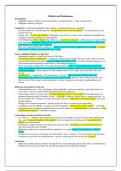Other
Othello and Desdemona's relationship in "Othello"
- Course
- Institution
A full, in-depth A* essay plan exploring the relationship between Othello and Desdemona in Shakespeare's "Othello", for the Pearson Edexcel A-Level English Literature.
[Show more]



